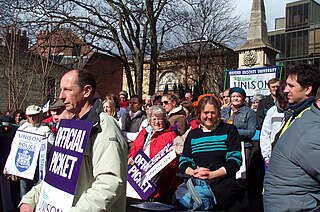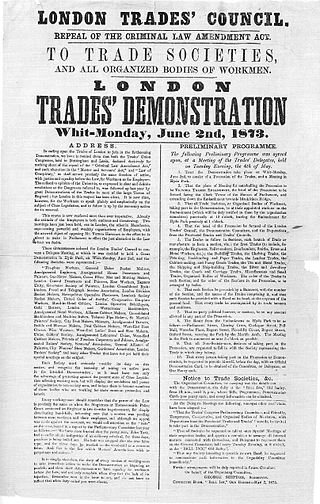Related Research Articles

The Scottish Trades Union Congress (STUC) is the national trade union centre in Scotland. With 40 affiliated unions as of 2020, the STUC represents over 540,000 trade unionists.
The Labour Research Department (LRD) is an independent trade union based research organisation, based in London, that provides information to support trade union activity and campaigns. About 2,000 trade union organisations, including 51 national unions in the UK, representing more than 99% of total Trades Union Congress (TUC) membership, are affiliated.

Trade unions in the United Kingdom were first decriminalised under the recommendation of a Royal commission in 1867, which agreed that the establishment of the organisations was to the advantage of both employers and employees. Legalised in 1871, the Trade Union Movement sought to reform socio-economic conditions for working men in British industries, and the trade unions' search for this led to the creation of a Labour Representation Committee which effectively formed the basis for today's Labour Party, which still has extensive links with the Trade Union Movement in Britain. Margaret Thatcher's governments weakened the powers of the unions in the 1980s, in particular by making it more difficult to strike legally, and some within the British trades union movement criticised Tony Blair's Labour government for not reversing some of Thatcher's changes. Most British unions are members of the TUC, the Trades Union Congress, or where appropriate, the Scottish Trades Union Congress or the Irish Congress of Trade Unions, which are the country's principal national trade union centres.

The Industrial Relations Act 1971 was an act of the Parliament of the United Kingdom, since repealed. It was based on proposals outlined in the governing Conservative Party's manifesto for the 1970 general election. The goal was to stabilize industrial relations by forcing concentration of bargaining power and responsibility in the formal union leadership, using the courts. The act was intensely opposed by unions, and helped undermine the government of Edward Heath. It was repealed by the Trade Union and Labour Relations Act 1974 when the Labour Party returned to government.
The Miners' Federation of Great Britain (MFGB) was established after a meeting of local mining trade unions in Newport, Wales in 1888. The federation was formed to represent and co-ordinate the affairs of local and regional miners' unions in England, Scotland and Wales whose associations remained largely autonomous. At its peak, the federation represented nearly one million workers. It was reorganised into the National Union of Mineworkers in 1945.
Community is a British trade union which formed in 2004. The union represents workers in a diverse range of sectors, including iron and steel, justice and custodial, domestic appliance manufacturing, textiles and footwear, road transport, betting, the third sector, education and early years as well as the self-employed.

The General Federation of Trade Unions (GFTU) is a national trade union centre in the United Kingdom. It has 35 affiliates with a membership of just over 214,000 and describes itself as the "federation for specialist unions".
Trade unions in Ghana first emerged in the 1920s and have played an important role in the country's economy and politics ever since.

The Sheffield Trades and Labour Council, usually known as the Sheffield Trades Council, is a labour organisation uniting trade unionists in Sheffield.

Greater London Association of Trade Union Councils (GLATUC) is the largest County Association of Trades (Union) Councils in the Uk and covers the Greater London area. As the official Trades Union Congress body for London GLATUC seeks to co-ordinate activity by Trades (Union) Councils across the capital and works with individual unions and other organisations on a range of campaigns and activities. It is part of the national Trades Union Congress.

The Irish Trades Union Congress (ITUC) was a union federation covering the island of Ireland.

Frances Lorraine Maria O'Grady, Baroness O'Grady of Upper Holloway, is a British former trade unionist leader, who served as the General Secretary of the British Trades Union Congress (TUC) from 2013 to 2022, being the first woman to hold the position. After O'Grady presented her resignation in 2022, Paul Nowak was selected to succeed her; he took up the post on 29 December 2022. O'Grady sits as a life peer in the House of Lords.

The Trades Union Congress (TUC) is a national trade union centre, a federation of trade unions that collectively represent most unionised workers in England and Wales. There are 48 affiliated unions with a total of about 5.5 million members. Paul Nowak is the TUC's current General Secretary, serving from January 2023.

The London Trades Council was an early labour organisation, uniting London's trade unionists. Its modern successor organisation is the Greater London Association of Trades (Union) Councils
The General Council of the Trades Union Congress is an elected body which is responsible for carrying out the policies agreed at the annual British Trade Union Congresses (TUC).
The Parliamentary Committee of the Trades Union Congress was the leading body of the British trade union movement from 1871 until 1921.
The history of trade unions in the United Kingdom covers British trade union organisation, activity, ideas, politics, and impact, from the early 19th century to the present.
The GCHQ trade union ban was a ban on trade union membership of employees at the Government Communications Headquarters in Cheltenham between 1984 and 1997. This was based on the claim by the Conservative government that it undermined national security. It sparked a dispute which became a cause célèbre, one of the most important trade union issues of the 1980s and the second longest continuously fought dispute in British trade union history.
The Notts Trades Council, formally known as the Nottinghamshire Nottingham and Mansfield Trades Council, brings together trade unionists in Nottinghamshire, in England.
References
- 1 2 "TUC disputes: principles and procedures" (PDF) (2019 ed.). Trades Union Congress. March 2019. p. 5. ISBN 978 1 911288 53 4.
- ↑ J., Elgar; R., Simpson (1 July 1993). "The TUC's Bridlington principles and interunion competition". eprints.lse.ac.uk.
- ↑ "TUC disputes: principles and procedures" (PDF) (2019 ed.). Trades Union Congress. March 2019. pp. 2–3, 33–36. ISBN 978 1 911288 53 4.